Church or techno temple? For hundreds of demonstrators on Theresienwiese a year ago, the direction of march was clear: “Let’s dance. Amen!” they wrote on the posters. And: “Swap the Bible for a blender.” They chanted: “Bass instead of praying.” Everyone as they please, one would think. But not in Bavaria. Here the law stipulates that there are nine quiet days a year and on those days you are not allowed to dance or have fun. The techno collectives’ action in Munich a year ago didn’t change that. And also not the attempts by the organizers and restaurateur representatives to negotiate against the CSU’s anti-fun act, who had hoped for a relaxation of the dancing ban, especially in the Bavarian election year.
That’s exactly why another ritual will be celebrated in addition to Easter this year: the dance lovers’ protest festival. And it will be bigger than ever in Munich: with a demonstration, a two-day huge rave and a total of 47 parties on the most important church days of mourning of the year. Due to a ruling by the Constitutional Court, everyone who professes to be anti-Christian can have uninhibited fun. At least for the duration of the party.
Already on Maundy Thursday, a quiet day although also a working day, things will get loud: 1000 participants are expected at a demonstration on Königsplatz from 4 p.m. The battle cry is: “Holy Shit. Let us rave!” The initiative again comes from Ravestreamradio, an association of 40 young culture warriors who are committed to electronic club music – with events, media contributions, music and demos. For the chairman of the meeting, Richard Meinl – logically, as a techno organizer – the “outdated regulations” in Bavaria are “a thorn in the eye”, or rather: in the ear. From his point of view, the state’s care for grieving Christians in a secular country is full of contradictions: “Nobody pays any attention to Muslims during Ramadan,” he says, for example.
In 2023, the demonstration against the dancing ban marched through the city with musical floats. For logistical reasons, we will remain stationary at Königsplatz in 2024.
(Photo: Alessandra Schellnegger)
“What should bother a believing Christian if a party takes place in a closed room?” Assunta Tammeleo will ask again at the demo. With her constitutional complaint in Karlsruhe in 2016, the chairwoman of the Federation for Freedom of the Spirit (BFG) fought for an exception for celebrations on church holidays that are explicitly ideologically different from Christianity. The state shouldn’t dictate how people spend their free time on a public holiday, she says: “We don’t force anyone to dance with us.”
Many clubs and cultural organizers have joined the demands of the demonstrators, for example Rote Sonne, Harry Klein and Muffatwerk. The cultural center, one of the most important and largest in the city, writes: “The quiet holidays occur in the two main times of concert tours, in spring and autumn, which (…) causes many a culturally valuable concert in Munich to fail.” Artists are allowed to act as a compromise if their performances do justice to the spirit of the holiday. “But it’s hardly possible to explain this to an artist without hearing the word censorship in the conversation.”
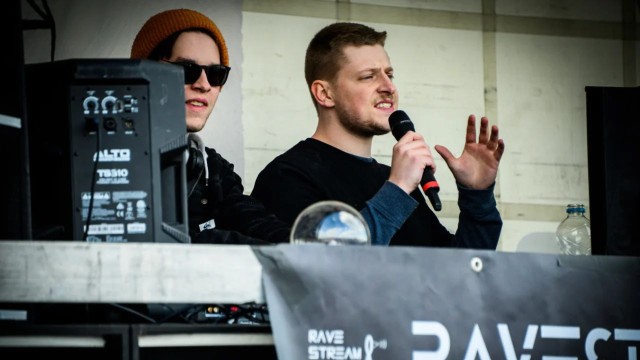
Richard Meinl from Ravestreamradio will speak as a meeting leader at the demonstration on Maundy Thursday.
(Photo: Alessandra Schellnegger)
In addition to speeches, music will also be heard on Königsplatz, because it is “the most important means of demonstration,” says Richard Meinl. A strong sound system will “ensure that the protesters’ message is heard loud and clear.” And then it continues on Maundy Thursday and Good Friday, from 9 p.m. to 5 a.m., at the “Heathens Festival” in the night gallery and night work club (Landsberger Straße 185). The largest rave of its kind has space for 2,500 guests every evening. Local and international DJ stars will play with a monster sound system specially brought from Schwerin and a gigantic laser LED light show, such as DLV, Luciid, Raxeller, Encountear or the masked techno monk Holy Priest; there is an art alley, food trucks and in between live music and speeches.
Other clubs are also opening under the guise of the BFG, as if Silent Days didn’t exist: 14 clubs such as Freiheitshalle, Neuraum, Milchbar, 089, Sweet, Pacha, are joining forces with a collective ticket for a “club revolution” on Maundy Thursday. Also in Backstage, Bahnwachter Thiel, Rote Sonne, Import Export, Unter Deck, Keg Bar – and where isn’t it? – will be celebrated against the ban on dancing until Easter Sunday. But everyone has to include speeches every two hours pro forma. However, many people don’t take the matter as seriously as he does, estimates Richard Meinl; he complains about the “lack of support from many in the scene at the demo”.
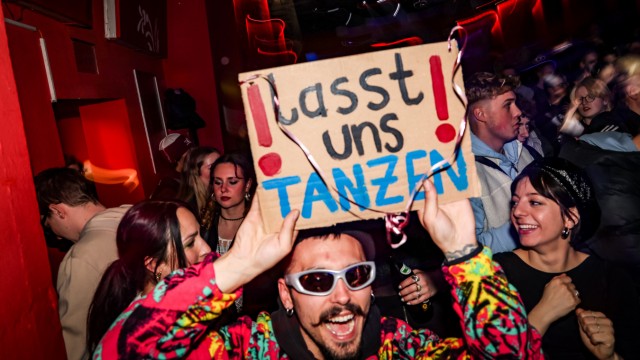
Celebrating and protesting will belong together in the night gallery in 2023.
(Photo: Leonhard Simon)
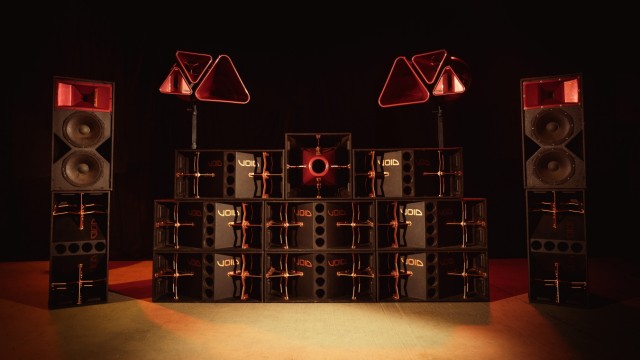
This sound system, which was specially brought from Schwerin, is also one of the loud stars of the “Heathens Festival 2024”.
(Photo: Ravestreamradio)
In fact, the camp of those opposed to the dance ban is divided on the means. Alexander Baehr, head of music and scene at the Dehoga restaurateurs’ association, will open his restaurants Schlagergarten, Rockkeller and Kölschbar in the Werksviertel himself. Because in conversations with politicians they were turned down (“No, that won’t work in Bavaria,” Markus Söder is said to have told him), but in order to survive they had to be allowed to open their shops, and the three quiet Saturdays in November were particularly painful. “But actually I’m not against the church, I’m just for reason,” he says. That’s why he wants to visit Munich’s Archbishop Cardinal Marx together with Dehoga President Angela Inselkammer these days and perhaps negotiate a “gentleman agreement”: “On Good Friday it’s closed for 24 hours and that’s it. Maybe he’ll come to meet us on other days.”
The Association of Munich Cultural Organizers (VDMK), which supports the demo, is also continuing to try backroom diplomacy and is counting on generational change in the new CSU parliamentary group. You would be content with a few public holidays and could, for example, do without the national day of mourning and Catholic Good Friday and thus even sharpen their perception, explains VDMK managing director David Boppert. What he doesn’t like is that the BFG is creating a monopoly on celebrations. “Many Munich clubs don’t want to join in because they say: I have to go against the church, that’s not my path.” However, the CSU also uses such tricks to organize: The lively speeches on political Ash Wednesday are nothing more than a beer-fueled folk festival.
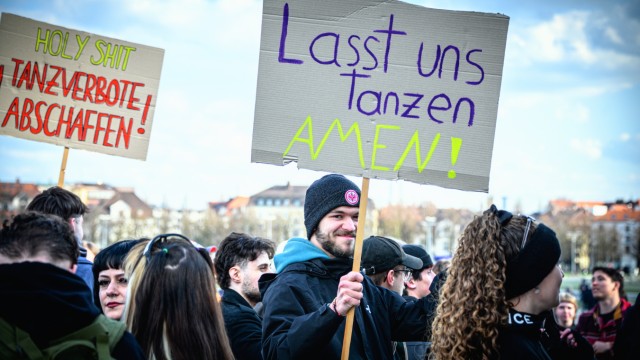
“Let’s dance. Amen!”: Protest party against the ban on dancing on the so-called Silent Days on Theresienwiese 2023.
(Photo: Alessandra Schellnegger)
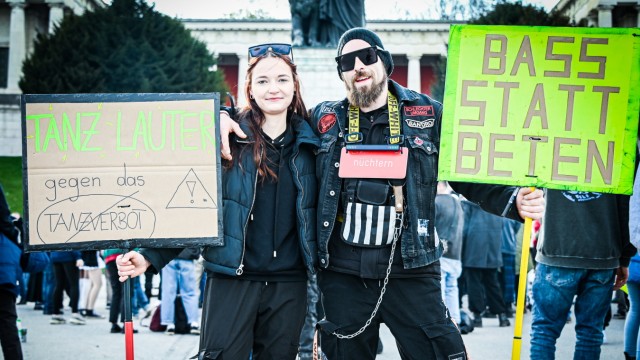
These demonstrators wanted to “bass instead of pray.”
(Photo: Alessandra Schellnegger)
The CSU is in a quandary. Stephan Oetzinger, the state chairman of the University and Culture Working Group, calls it a “dilemma”. He knows “the not unfounded interest of the clubs and cultural people”; he knows that nine quiet days are more in Bavaria than in other federal states. But he also knows how holy Good Friday and Day of Penance and Prayer are to the Protestant and Catholic religious communities. He asks himself whether the people still want to mourn the fallen on Remembrance Day, which would certainly be appropriate in these times of war. What he doesn’t know yet: How the group with a third of new MPs feels about it. During fireside chats, such as a working group with the “rock sociologist” Rainer Sontheimer, “threads of conversation” were picked up. He wants to bring everyone involved to a round table, “but we’re not there yet.”
That doesn’t sound like it will be relaxed any time soon. And for so long, dance and protest have formed an – unholy – alliance on church silent days. Ravestreamradio-Richi was astonished to note at the 2023 party that the speeches didn’t disrupt the celebration: “The crowd was even more keen than at the demo to chant loudly in between. Like: Do we want to celebrate on public holidays?” Maybe they will be heard, and maybe at some point it will be: “Bass AND pray!”

